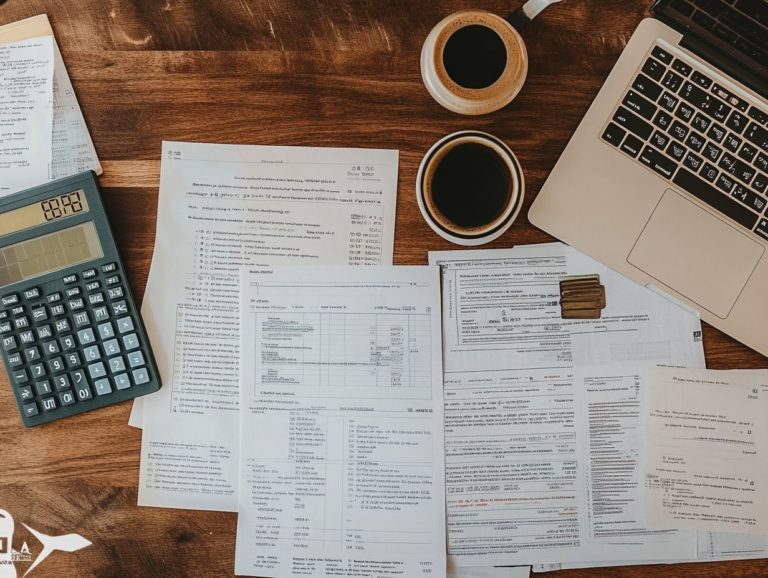The Tax Implications of Freelance Side Hustles
Freelancing and side hustles can unlock incredible flexibility and income potential! However, they also introduce distinct tax responsibilities that you need to manage.
Understanding your tax obligations is vital for effective financial management. This article delves into self-employment taxes, common deductions, and the essential forms and deadlines for reporting your income. It offers practical tips for budgeting and record-keeping. Keep reading to make your freelance journey financially rewarding and stress-free!
Contents
- Key Takeaways:
- Tax Obligations for Freelancers
- Reporting Freelance Income
- Managing Taxes as a Freelancer
- Potential Penalties for Non-Compliance
- Frequently Asked Questions
- What are freelance side hustles?
- Do I need to pay taxes on my freelance side hustle income?
- What are the tax implications of freelance side hustles?
- Do I need to keep track of my income and expenses from my freelance side hustle?
- What expenses can I deduct from my freelance side hustle income?
- When do I need to file and pay taxes on my freelance side hustle income?
Key Takeaways:

- As a freelancer, understanding your unique tax obligations is key to financial success!
- Learning how to manage your taxes effectively can help you keep more of your hard-earned money!
- Properly reporting income and budgeting for taxes are essential for freelance financial success and avoiding penalties for non-compliance.
Defining Freelance Work and Side Hustles
Freelance work and side hustles have become increasingly appealing as flexible income sources for those seeking self-employment opportunities. These avenues empower you to leverage your skills and passions, allowing you to offer services or products while maintaining full control over your schedule.
Unlike traditional employment, freelancing gives you the freedom to set your own rates and choose projects, which can lead to potentially higher earnings based on the demand for your specialized skills. To navigate the financial aspects of freelancing, consider these tax planning tips for new freelancers. Side hustles, on the other hand, usually involve activities that generate supplementary income alongside your full-time job and may not require the same level of commitment or investment.
The benefits of self-employment extend beyond just financial independence. They also nurture your creativity and foster personal growth through entrepreneurial endeavors, contributing to the vibrant gig economy. It’s essential to understand the role of the IRS in regulating self-employment, as you’ll need to adhere to tax requirements related to your freelance income, ensuring you manage your financial responsibilities effectively.
Tax Obligations for Freelancers
Understanding your tax obligations as a freelancer is essential to sidestep unexpected financial burdens when tax season rolls around. As an independent contractor, you are responsible for reporting your income and paying taxes directly to the IRS.
This responsibility includes not just income tax but also self-employment taxes, which fund Social Security and Medicare contributions. Neglecting to accurately report your income or pay estimated taxes could lead to IRS penalties and a higher tax liability.
Therefore, staying informed and organized is crucial. By effectively managing these obligations, you can maintain your financial health and avoid complications down the road.
Understanding Self-Employment Taxes
Self-employment taxes play a significant role for freelancers and independent contractors, encompassing both the employee and employer portions of Social Security and Medicare taxes.
Unlike traditional employment taxes, where employers conveniently withhold these amounts from your paycheck, you are fully responsible for paying these taxes quarterly. This can make the calculation process a bit more intimidating, as you need to figure out your net income—essentially, your total earnings minus any allowable business expenses. To help navigate this process, consider following 5 essential tax tips for creative freelancers.
To navigate this reporting process smoothly, it’s crucial to maintain meticulous records of your income and expenses. Not only does this simplify filing, but it also provides a safeguard against potential audits. Effective record-keeping enables you to confirm your income and minimize your taxable amounts, ultimately enhancing your financial management and ensuring compliance with tax laws.
Common Tax Deductions for Freelancers

As a freelancer, you have access to a range of tax deductions that can significantly reduce your taxable income and overall tax burden. It’s crucial to understand which expenses qualify as common work-related costs so you can maximize your deductions effectively.
Beyond home office deductions, which allow you to claim a portion of your housing costs think utilities and internet you can also include expenses related to software, equipment, and marketing.
Keeping meticulous records and accurate receipts is essential. This not only supports your claims but also ensures compliance with IRS requirements.
When it s time to report these deductions on Schedule C, knowing the categories will streamline the process for you. This makes it easy to detail each expense and its purpose.
Diligently recording these costs can lead to amazing savings and more money to reinvest in your business.
Reporting Freelance Income
Accurately reporting freelance income is a fundamental responsibility you hold as a self-employed individual. This ensures you remain compliant with IRS regulations.
You must report all income received, typically using Form 1040 for your individual tax returns and various 1099 forms for reporting nonemployee compensation.
Depending on your income sources, you may receive Form 1099-MISC or Form 1099-NEC from clients, which detail the total payments made throughout the year. This meticulous process helps you steer clear of IRS penalties.
Establishing a reliable record of your earnings paves the way for effective financial planning in the future.
Forms and Deadlines for Reporting Income
As a freelancer, you’ll need to navigate various forms and deadlines to ensure your income reporting is timely and accurate. This is crucial for compliance with IRS requirements.
Key forms to familiarize yourself with include Schedule C, used for reporting your business income, along with the corresponding deadlines that align with individual tax seasons.
Missing deadlines could lead to costly penalties, so stay on track! Understanding the necessary paperwork and timelines for your tax payments is vital.
One of the most critical milestones you’ll face is filing your annual tax return by April 15. You’ll also need to manage estimated tax payments, which may be due quarterly. Keeping meticulous records throughout the year is essential.
These estimated payments are generally calculated using Form 1040-ES, making accuracy paramount to avoid underpayment penalties. Remember, the IRS charges interest on any unpaid tax amounts, which can further compound your financial burdens.
By staying informed about these forms and their respective deadlines, you can navigate your tax obligations with greater confidence, ensuring you remain in good standing with the IRS.
Managing Taxes as a Freelancer
Effectively managing taxes as a freelancer is crucial for achieving financial stability and peace of mind, particularly in the face of unpredictable income.
By establishing a structured approach to budgeting and record-keeping, you can significantly alleviate the stress that comes with tax season.
It s wise to set aside a percentage of your income specifically for quarterly taxes. This proactive measure ensures that you re prepared for tax payments and helps minimize the risk of financial penalties.
Consulting a financial advisor can provide you with customized strategies to optimize your tax management and enhance your overall financial well-being.
Tips for Budgeting and Record-Keeping

Effective budgeting and keeping good records are essential strategies for freelancers to manage finances and prepare for tax obligations.
By crafting a comprehensive budget that outlines expected income from side jobs and freelance gigs, you can allocate funds for taxes and everyday expenses. This ensures you’re never caught off guard.
Leverage tax software to streamline the process of tracking receipts and expenses. This makes it easy to compile all necessary documentation when tax season rolls around.
Explore various tools that can enhance your financial management. Many freelancers find that using mobile apps for record-keeping simplifies their tracking process and provides real-time updates on spending.
Keeping all your receipts organized, whether digitally or physically, is vital for verifying expenses during tax preparation. This creates a clear audit trail.
Regularly reviewing these records allows you to maintain an accurate understanding of your cash flow, empowering you to make better financial decisions for future projects.
Potential Penalties for Non-Compliance
Non-compliance with tax regulations can lead to serious penalties for freelancers, impacting financial well-being and future business ventures.
The IRS has a range of penalties that escalate with the severity of the violation, including late payment penalties and interest on unpaid tax liabilities.
Understanding these potential consequences is essential for reducing your tax burden and ensuring compliance with IRS requirements.
Neglecting your tax obligations responsibly may result in financial penalties that could stifle your business growth.
Consequences of Not Paying Taxes as a Freelancer
The consequences of not paying taxes as a freelancer can be quite severe, leading to immediate financial burdens and long-lasting repercussions.
Failing to meet your tax obligations poses the risk of incurring financial penalties that can snowball quickly, worsening your overall tax liability.
The IRS has the power to initiate collection actions against you, which can create additional stress and complications in managing your business finances.
Understanding the ramifications of non-payment is crucial for safeguarding your financial future and ensuring compliance.
Neglecting timely payments can also invite audits, complicating an already challenging financial landscape.
The tax burden can feel overwhelming, eating into your current income and potentially leading to higher tax rates down the line.
Don’t ignore the fact that the longer you delay settling your tax responsibilities, the more daunting the eventual reckoning becomes.
By taking a proactive approach, you can alleviate the anxiety surrounding due dates and foster a positive relationship with tax authorities, paving the way for a smoother financial journey.
Frequently Asked Questions
What are freelance side hustles?

Freelance side hustles are jobs or projects individuals take on outside of their main full-time job or business.
These can include services like graphic design, writing, photography, or any other skills that can be offered on a freelance basis.
Do I need to pay taxes on my freelance side hustle income?
Yes, any income earned from freelance side hustles is considered taxable income by the government.
This means you are required to report and pay taxes on your earnings, just like you would for your regular job.
What are the tax implications of freelance side hustles?
The tax implications include reporting your income on your tax return and paying self-employment taxes.
These are taxes that freelancers pay on their income, similar to what employees have taken out of their paychecks.
You can also deduct business expenses and potentially make quarterly estimated tax payments.
Do I need to keep track of my income and expenses from my freelance side hustle?
Yes, it is important to keep detailed records of all income and expenses related to your freelance side hustle.
This will make it easier to accurately report your earnings and deduct any eligible business expenses on your tax return.
Start organizing your receipts today to avoid stress during tax season!
What expenses can I deduct from my freelance side hustle income?
You can deduct expenses necessary to run your freelance business. These include equipment, supplies, home office costs, and marketing expenses.
Keep receipts and records of these expenses for tax purposes.
When do I need to file and pay taxes on my freelance side hustle income?
File and pay taxes on your freelance income by the same deadlines as your regular taxes. Don t miss your deadlines! Make quarterly estimated tax payments throughout the year and file your tax return by the April deadline.






